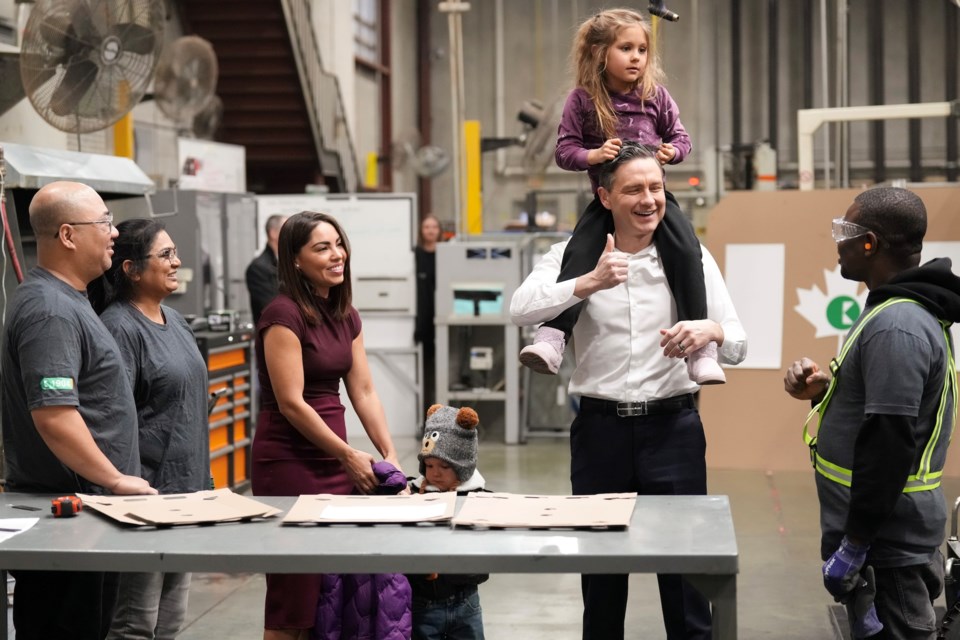Editor's note: This article originally appeared on Parliament Today, a Village Media newsletter devoted exclusively to covering federal politics.
Before getting into his campaign launch speech on Sunday, Pierre Poilievre took a moment to introduce his kids.
"Our little munchkins — I think that my little girl got bored and left me, so I'll have to give the speech again when we get home," he quipped after his daughter, Valentina, had left the press conference sometime during the French version of his remarks.
But his son Cruz had stuck around.
"As you can see, he's dressed as a fighter pilot, and we have our pet penguin with us today, too," Poilievre told the crowd in Gatineau, Que.
The Conservative leader has been taking his family with him in the early days of his campaign to become prime minister, and voters who see his speeches and photo-ops can see the kids getting carried around by their dad and boarding the new campaign plane.
Conservatives will cut income taxes to save families almost $2000/year.
— Pierre Poilievre (@PierrePoilievre) March 25, 2025
You worked hard, and you should bring it home—for a change: https://t.co/eIy7PDtCaB pic.twitter.com/QuugR7JG0E
Bringing the kids along is a practical solution for a politician who needs to balance a busy political campaign with spending time with young kids, and it has its political upsides, too, according to two political veterans who spoke with Village Media.
A political campaign is like a very busy time for any working family, except that you're also constantly on the road, said Laryssa Waler, managing partner of Henley Strategies, who previously ran communications for Ontario Progressive Conservative Premier Doug Ford.
"You're always looking for moments to be able to carve out with your family. If you're on the road and you're able to take your children with you because they're young, I think you're lucky that way," she said.
Ashley Csanady, a vice-president at McMillan Vantage and mother who's worked with Liberal parent-politicians on campaigns, sees it the same way.
"If they're young enough that they're not in school, and you can have your family with you on the campaign trail — like that would be such a stress relief," she said. "At the end of the day, politicians are humans and being able to have 10 minutes of a giggling toddler is a great way to have your few minutes of downtime."
That's not to say it's easy, particularly when the kids are quite young.
"I can't imagine how hard it is," Waler said, speaking from experience with her own kids.
"Plans are adjusted because children aren't performers, they're children, and they have needs, and they have to sleep and they have to eat and they have to rest," said Waler. "Parents know that, and staff gets to know that really quickly too."
While the public at large would treat a crying toddler with grace, there's a risk that some voters might be inclined to judge the parent-politician for their reaction to a meltdown, according to Csanady.
For her part, Waler said that Canada has relatively healthy norms for how the media, political opponents and most of the public at large treat politicians when it comes to their families, especially compared to the United States.
"By and large, children are off limits with any form of criticism," she said, adding that it's okay to "make note of the presence of the children, but that's where it has to stop."
"That the idea that a politician brings this child, or his children, or her children to a press conference, that that makes them fair game for criticism is false," she said."We shouldn't accept, as a society, for media or the public to criticize a politician's child, younger or adult, because of the job of the parent."
The only exception for Waler is for adult children who are themselves involved in politics, such as Donald Trump Jr. or Ivanka Trump.
"We don't talk about anything that has to do with your private life in the Canadian political context. And I think that we haven't done that, because once political parties are doing that to each other, you're fair game. And I think that political parties have done a really good job in Canada of not making their opponent's child or family part of the story," she said.
"Media has done a reasonable job, but I think it takes discipline from everybody, and it takes discipline from the public to not read those stories, and for the public to say that's not okay," she added.
There was a hit piece from an activist right-wing media outlet concerning one of Liberal Leader Mark Carney's children that both Waler and Csanady vehemently condemned.
All of that said, both agree that there are political upsides to letting the public see a politician as a parent.
"It does always portray an image of youthful vitality — and softness and kindness for male politicians in particular," said Csanady, adding that this is particularly helpful when it comes to Poilievre.
Csanady added that images of Justin Trudeau as a child when his father was prime minister were always powerful, as were the images of him with his own children during his early campaigns.
However, the benefits aren't clear for female politicians, who still have to battle gender stereotypes, according to Csanady.
Waler said glimpses of politicians with their families show them as relatable.
"I wouldn't want anybody running the country that could spend that much time away from the child and not be impacted by it," she said. "So I think it's important that we make allowances and give room for politicians to have their families with them, because I think it'll make them better at governing, and better at campaigning, and better overall."
